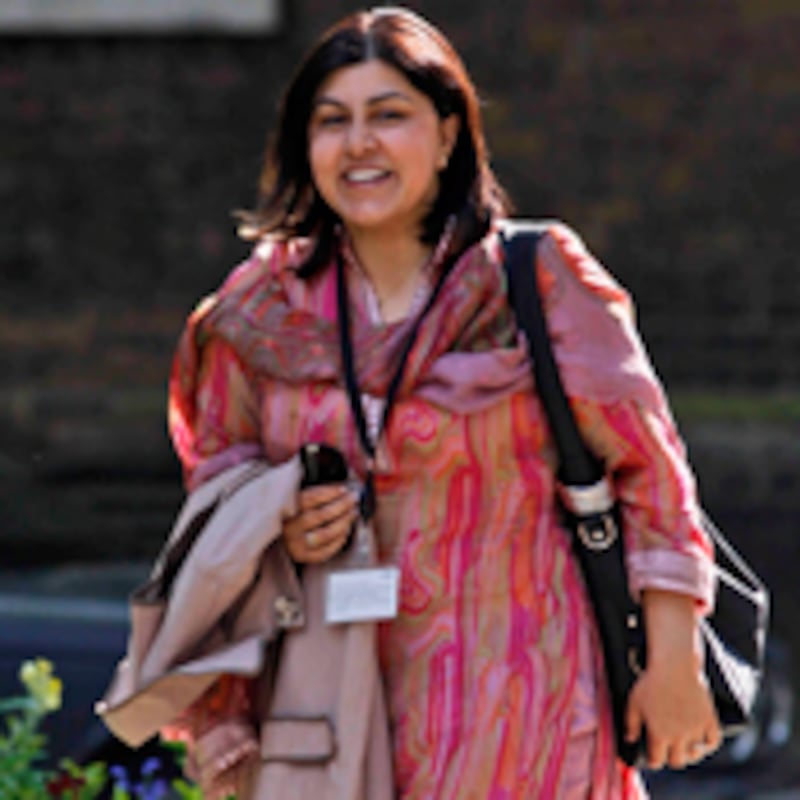
The U.K. just got its first female Muslim cabinet member, a divorced young baroness who represents the country’s contradictions. Naseem Khan on what Pakistanis—and the Taliban—think of her.
Baroness Sayeeda Warsi embodies the sprawling contradictions of contemporary British politics: She is a young, divorced Muslim woman—and the co-chairman of the Conservative Party.
Last week, she dazzled the cameras, resplendent in the vibrant pinks and shimmering gold of her traditional Pakistani dress, striking a remarkable contrast to her dark-suited colleagues, who are mostly white males educated at Oxford or Cambridge.
Some have seen her appointment as a feeble attempt by the Conservative Party to present a more multicultural front, and the outspoken baroness has agitated people across the political spectrum.
But the meteoric rise of Baroness Warsi, who is the first Muslim cabinet minister in Britain, hasn’t just captured the imagination of many Brits. It also has been followed keenly thousands of miles away from Downing Street—in Peshawar and the militant areas on Pakistan’s northwestern border with Afghanistan.
In the Pakistani press, her appointment has been widely celebrated. “The U.S. lags behind,” declared the newspaper The Pakistan Patriot. “When will President Obama find a competent Muslim to head up a major department or area?”
“Her becoming minister can help improve Pakistan’s image there,” said Arshad Ahmad, a Pashtu pharmacist in Peshawar. “You know many Pakistanis were worried about their future if the Conservatives came to power because of its strict immigration policy. But now this lady will be sitting in the cabinet; she will have influence and help these worried Pakistanis.”
“This Pakistani lady should tell them we are peace-loving people and need the attention of the world to help us get rid of terrorism,” said Rashid Khan, a schoolteacher.
But in the lawless tribal areas along the border with Afghanistan, many say they think Warsi’s appointment will not change British policy toward Muslims at home or abroad. Whether “she is a Muslim or Pakistani, she is part of their society and will definitely serve their interests first,” Maulvi Rahmanullah, a commander of the Punjabi Taliban, told a local journalist.
In Britain, Warsi’s political ascendancy has been controversial. Some have seen her appointment as a feeble attempt by the Conservative Party to present a more multicultural front, and the outspoken baroness has agitated people across the political spectrum.
In 2005, gay rights activists accused her of disseminating homophobic literature after leaflets were used in her parliamentary campaign claiming that by lowering the homosexual age of consent from 18 to 16, the Labour government was “allowing schoolchildren to be propositioned for homosexual relationships and that homosexuality was being peddled to children as young as 7.”
Warsi is also a contentious figure within the Muslim community in Britain. Muslim protesters have accused her of supporting the killing of Muslims in Afghanistan and have pelted her with eggs. She argues that immigration in Britain is out of control and has said that the extreme right-wing British National Party has “some very legitimate views.” She is also against Muslim women’s groups, which she believes are patronizing, and has spoken out against polygamy, forced marriages, and female genital mutilation.
Among her political successes has been to help facilitate the release of English teacher Gillian Gibbons, who was jailed in the Sudan for allowing a classroom teddy bear to be named Muhammad.
Warsi’s life is a remarkable rags-to-riches story: A working-class, British-born Pakistani from northern England, she was appointed as one of just four women in the new cabinet. She is a minister without portfolio, a powerful position that isn’t confined to one ministry.
“To be born as the daughter of an immigrant mill worker in a mill town in Yorkshire, to have the privilege of serving in cabinet at such an important time in Britain's history, I think it is terribly humbling,” she told reporters after her appointment.
Carrying the equivalent of $5 in his pocket, Warsi’s father arrived from Pakistan in the 1960s and found work as a mill worker before making a fortune with his own furniture company. Warsi, one of five sisters, was born in 1971 in Dewsbury, an economically depressed town in West Yorkshire that was also the home of Mohammed Siddique Khan, the ringleader behind the 2005 London bombings.
Warsi went to state schools, attending Birkdale High School and Dewsbury College, a far cry from Eton and Westminster, where Prime Minister David Cameron and Deputy Prime Minister Nick Clegg were groomed.
At 19, during her first year at Leeds University, where she had gone to study law, she married her cousin Naeem in an arranged marriage that later resulted in divorce. The two have a 12-year-old daughter, Aamna, whom her parents help care for. Warsi remarried in August last year.
After graduating from Leeds, Warsi set up her own law practice in Dewsbury before venturing into politics. She has never held elected office; she lost her 2005 race for a parliamentary seat. But in July 2007 Cameron made her the youngest member of the House of Lords, paving the way for her eventual appointment as the first Muslim member of the cabinet.
“I don’t know much about politics,” said Shaheen Hanif, a British Pakistani who lives in West Yorkshire. “But when I saw her on the television in her traditional clothes, I thought, ‘That’s so nice to see her there.’ It made me happy.”
Naseem Khan is a London-based freelance writer and producer. She trained as a doctor but got sidetracked by television and previously worked for the Associated Press Television.





